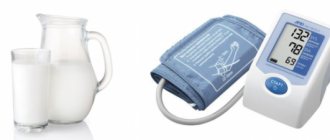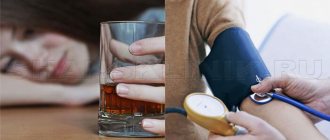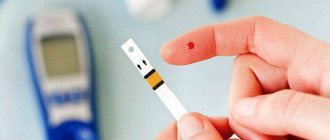The multifactorial effect of smoking on blood pressure has both immediate and delayed effects. A rapid rise in blood pressure after smoking is associated with the direct effect of nicotine on blood vessels and their regulation: by providing an n-cholinomimetic effect (that is, irritating the corresponding receptors), nicotine causes a reflex constriction of blood vessels, and after the spasm, blood pressure increases.
The second aspect of nicotine’s effect on blood pressure is its stimulation of the release of adrenaline through the sympathetic nervous system.
The delayed effect in the form of chronic arterial hypertension is associated with a violation of vascular regulation due to the formation of a pathological chain “nicotine - blood vessels - pressure” with a corresponding vascular response. The cause of hypertension in smokers also lies in respiratory and circulatory disorders that are inevitable when smoking.
In this case, there is chronic activation of chemoreceptors, and through them the excitation of the sympathetic nervous system with subsequent reactions of the nervous, vascular, and endocrine systems.
Content:
- What affects blood pressure (BP) levels?
- How does nicotine affect blood pressure?
- Consequences of long-term smoking
- Nicotine and blood pressure, how to prevent complications
- In what cases does nicotine reduce blood pressure?
Tobacco smoke contains many ingredients that have a negative impact on human health. Regular smoking causes the development of a number of diseases. The cardiovascular system suffers the most. Nicotine increases blood pressure in a smoker, has a toxic effect on the myocardium, impairs its blood supply and promotes hardening of the coronary arteries . All these disorders lead to the development of many diseases that reduce a person’s quality of life. To avoid problems, you need to give up your bad habit in a timely manner, and even better, never start smoking.
Smoking lowers blood pressure
Nicotine can also lower blood pressure - there are also many predisposing factors to this. Many of them are associated not only with the influence of nicotine, but also with the conditions that it causes when it enters the body. For example, the arrhythmogenic effect of nicotine is associated with hypotension and a vascular response in response to a drop in blood pressure.
An increase in the release of norepinephrine under the influence of nicotine is also important: norepinephrine affects α2 receptors, the stimulation of which leads to a decrease in blood pressure.
Hypotensive patients are characterized by daytime sleepiness, prolongation of night sleep, a tendency to fainting or pre-fainting, and weather sensitivity. They are weak and broken in the morning (in hypotensive smokers, morning coughing attacks lead to severe dizziness, “green” in the eyes, palpitations and sweat).
Pale skin, constantly cold nose, ears, feet and hands, memory impairment, decreased motor and mental activity, exercise intolerance, motion sickness when traveling, mild nausea - for example, just when thinking about upcoming trouble.
When inhaling, smokers suffering from arterial hypotension may experience severe dizziness, a feeling of slowing down of everything that is happening, a desire to sit or lie down, and a headache in the forehead, above the eyes. The inhaled air seems cold, sounds are muffled, sensitivity to smell, color, and taste disappears or sharply decreases.
What to do?
There are no special measures to help a hypotensive smoker. It is recommended to adjust your diet (exclude fatty and overly sweet foods) and physical activity, get enough sleep, and take vitamin and mineral complexes on the advice of your doctor.
It is better to smoke in the fresh air, away from other smokers, it is advisable to sit while smoking, and if blood pressure drops too sharply, immediately sit down and put your head on your knees.
For many people, drinking a cigarette and coffee at the same time helps - only it has a too “lethal” effect on the blood vessels.
What affects blood pressure (BP) levels?
The substances that make up tobacco smoke cause spasms of the vascular bed throughout the body. But at the same time, the volume of circulating blood remains unchanged. And sometimes it even increases. As a result, the smoker's blood pressure changes. is especially noticeable . It causes activation of the adrenal glands, releasing large amounts of adrenaline into the bloodstream. It is this substance that causes the primary vasospasm that develops immediately after the first puffs. This process is especially noticeable in the morning, when a person who wakes up has the habit of smoking the first cigarette on an empty stomach. Or what is even more harmful - do it with coffee. The adrenaline reaction is manifested by an increase in the number of heart contractions, which also contributes to disruption of the innervation of the arteries. Against this background, arrhythmia appears as an additional failure.
Nicotine raises blood pressure, which leads to:
- disruption of blood flow through the vessels and deterioration of its rheological properties.
- damage to arterial walls with the formation of atherosclerotic plaques due to increased cholesterol levels.
- Loss of vascular elasticity.
All of these factors lead to increased hypertension, and over time, the formation of hypertension and thrombotic processes.
How does tobacco smoke affect the heart and blood vessels?
To understand why smoking leads to pressure surges, you need to understand what exactly happens when cigarette smoke enters the body.
- After inhaling and penetrating cigarette smoke into the lungs, harmful substances enter the bloodstream: after 7-8 seconds they end up in the brain, and circulate throughout the body in less than half a minute.
- Nicotine in the blood activates the increased work of individual organs: the brain begins to produce dopamine, which creates a feeling of pleasure; The adrenal glands lead to the release of adrenaline into the blood, accelerating the contraction of the heart - this is what increases blood pressure.
- Harmful substances have a destructive effect on the body: ammonia and formaldehyde compounds, which can cause various inflammations, lead to activation of the immune system; carbon monoxide interferes with the flow of oxygen to internal organs, which also increases heart rate and, as a result, increases blood pressure; the body tries to prevent the entry of harmful compounds from cigarette smoke - it spasms the blood vessels, reducing the lumen. This leads to a redistribution of blood flow, accumulations and thinning of the walls of arteries, vessels and capillaries.
The brain, having felt the effects of dopamine, begins to depend on smoking: after some time, it again requires a dose of nicotine to obtain pleasure. Over and over again, the processes described above are repeated, which gradually consumes the body’s resources. Ultimately, this can lead to rupture of the vessel, hemorrhage, stroke or heart attack.
How nicotine affects blood pressure and other body functions
There are many false rumors spread among smokers about the health effects of smoking. Some “experts” even manage to identify the benefits of a painful habit.
They claim that smoking a cigarette leads to:
Calm down.- Improved mood.
- Relieving internal tension.
- Increased appetite.
- Eliminate insomnia.
In fact, they simply describe the withdrawal syndrome that occurs when trying to quit a cigarette. In this case, the complaints described above appear, which go away safely with the first puffs after forced abstinence.
There is a claim that nicotine lowers blood pressure. And based on this assumption, some individuals try to “bring down” high blood pressure numbers by smoking. But they get the opposite effect. Thus, these people put their health at risk. Only when they feel noticeably ill do they consult a doctor. At the appointment, patients already ask the doctor whether nicotine increases or decreases blood pressure. The specialist can only tell patients about the real state of affairs and criticize the myths spread by incompetent individuals.
How to deal with this?
Smoking increases blood pressure - that's a fact. Only giving up a bad habit will keep your blood pressure under control. It’s even better if a smoker can change his lifestyle - start playing sports, lead an active lifestyle, give up salt or minimize its amount in the daily diet.
The fight against overweight or obesity (if these problems exist) should be a priority for a smoker. Eating foods rich in potassium and magnesium helps strengthen the walls of blood vessels, and additional administration of vitamin D, which has a positive effect on the formation of the enzyme responsible for increasing blood pressure, will help control blood pressure levels.
Lack of stress, regular visits to a cardiologist and therapist, as well as constant blood pressure monitoring will reduce the likelihood of developing hypertension.
Consequences of long-term smoking
Heavy smokers gradually develop chronic diseases.
Over time, they begin to experience:
- A constant cough with thick, dark sputum (especially in the morning), indicating bronchitis.
- Discomfort and pain in the chest area are characteristic of coronary heart disease, partly caused by the fact that nicotine increases blood pressure. At the same time, the heart muscle begins to experience a lack of blood supply - ischemia, which makes itself felt by unpleasant pain of varying intensity.
- Noise in the head caused by spasm of the cerebral vessels.
- Transient ischemic attacks, transient cerebrovascular accidents.
- Problems in the sexual sphere that appear as a result of direct toxic effects on the body. An increase in nicotine and blood pressure in the blood is one of the causes of intimate life disorders. When the addiction is eliminated, functions return to normal over time.
Does smoking increase or decrease blood pressure?
Does smoking and blood pressure definitely mean increased blood pressure? Not always. If it were possible to consider a certain ideally and unambiguously functioning human body, where all processes occur in accordance with schemes and rules, then hypertension would be inevitable.
However, in addition to stimulating the production of neurotransmitters, nicotine creates conditions under which the smoker’s body is in chronic hypoxia. With it, chemoreceptors (special mechanoreceptors, which, among other things, are responsible for vascular tone and breathing) in response to nicotine produce the so-called Bezold-Jarisch reflex, which is characterized by a decrease in heart rate and systemic hypotension.
Cigarette smoking and blood pressure can be related to each other in completely unimaginable ways. For example, the well-known fact of chronic hypovitaminosis in smokers and blood pressure - what do they have in common? However, it is known that a constant deficiency of vitamins C, group B and E are provoking factors for hypotension.
For the development of hypertension, the presence of pathological processes in the so-called target organs: kidneys, heart, blood vessels is important. And if many people more or less guess about the importance of the kidneys (more precisely, their pressor function) and the heart in the formation of hypertension, few smokers know that with obliterating endarteritis - a typical “nicotine” disease - blood clots often form (the so-called Virchow’s triad) , and blood clots, in turn, cause atherosclerotic changes in blood vessels.
Then the pathological chain continues: vascular atherosclerosis (especially the femoral arteries, iliac and lower extremity arteries) is a high risk factor for the formation of arterial hypertension.
Nicotine and blood pressure, how to prevent complications
To get rid of the negative consequences associated with smoking, there is only one way - complete cessation of the addiction. If you cannot quit smoking on your own, you will need to seek the help of a narcologist. Experienced doctors will quickly and effectively eliminate the problem using modern types of treatment.
For these purposes the following is used:
Drug treatment.- Psychotherapy.
- Substitution methods (use of patches, lozenges).
- Coding.
If we are talking about the initial forms of addiction to the smoking process, then most of the complications undergo a reverse development, including high blood pressure from nicotine.
Narcologist quickly:
- Eliminates nicotine intoxication.
- Relieves the craving for smoking.
- Will set the patient up to completely quit smoking.
- Prevent relapse by encoding for a long time.
Smoking treatment is carried out both on an outpatient basis and in a hospital setting.
A clinic where they can help
The harm of nicotine has long been proven, so you need to get rid of the habit. For 22 years, the IMC Addiction By Yuzapolsky clinic has been helping people get rid of addiction using specially developed proprietary methods. Specialists individually draw up a treatment plan according to the smoking history, psycho-emotional and physical condition of the patient.
Experienced neuropsychologists, narcologists, and psychotherapists work with each patient. There are rehabilitation programs for the patients themselves and their relatives. The clinic offers maximum comfort, there is a VIP department and single apartments. In this case, the treatment takes place completely anonymously. If you wish, you can choose an outpatient program.
In what cases does nicotine reduce blood pressure?
In a number of situations, paradoxical reactions of the body to smoke are revealed, in which instead of the usual increase in blood pressure, a decrease is observed.
This phenomenon occurs when:
Malfunctions of the nervous system.- Hormonal and enzymatic disorders.
- Paradoxical type of reaction to tobacco ingredients.
A decrease in indicators can occur against the background of acute complications caused by smoking. For example, in a non-smoking person, several puffs can cause severe intoxication, manifested by a fainting state, a collapse reaction, in which blood pressure drops sharply.
Awareness of all the negative consequences of smoking, and especially the question of whether nicotine increases blood pressure, forces many thinking people to make the right decision and get rid of the pathological habit.
Possible reasons
If your blood pressure rises, this condition may be caused by smoking cigarettes. Nicotine present in tobacco and tobacco products:
- Causes spasm of small vessels;
- Reduces the level of oxygen necessary for the normal functioning of the circulatory and other body systems;
- Acts as a stimulant on the heart, increasing its rhythm;
- Increases blood clotting;
- Damages cells in the coronary arteries and other blood vessels.
Regular cigarette smoking damages the inner walls of blood vessels, makes the arteries stiff and less elastic, changes the lipid profile of the blood, and also increases blood clots, activates the sympathetic nervous system and leads to increased levels of free radicals. Any of those reasons can contribute to high blood pressure.
Literature:
- Risk factors for arterial hypertension / V. R. Weber, B. B. Fishman; Feder. education agency, Novgorod. state University named after Yaroslav the Wise, Novgorod. scientific Center of the Northwestern Branch of the Russian Academy of Medical Sciences. — St. Petersburg: Novgor. state univ., 2005 (St. Petersburg: Printing house “Science”). — 207 p.
- Tobacco smoking in children and adolescents: hygienic and medical-social problems and solutions: monograph / A. A. Baranov, V. R. Kuchma, I. V. Zvezdina. - Moscow: Litterra, 2007. - 213 p..
- Assessment of the effect of smoking on visceral organs and regulatory functions of the body / Ibragimova Evelina Enverovna, Yakubova E.F., Yakubova Z.A. / 2021 / Population health and habitat.










